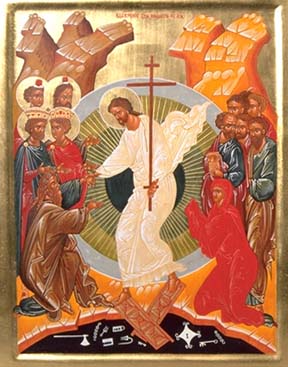All man-made religion stands in opposition to the gospel. It is an ascent toward the eternal, perfect God. Up, up—that is its call. God is high above, we are down below; and now we shall soar by means of our moral, spiritual, and religious endeavors out of the earthly, human depths into the divine heights.
 God is too high and the evil in us too deep for us to reach the goal this way. Our souls become crippled and cramped by trying to rise to the highest height. The end is despair, or a self-righteousness that leaves room neither for love of God nor for love of others.
God is too high and the evil in us too deep for us to reach the goal this way. Our souls become crippled and cramped by trying to rise to the highest height. The end is despair, or a self-righteousness that leaves room neither for love of God nor for love of others.
So if we are honest, we have to say that we cannot reach the goal. We cannot become what we ought to become, true men and women. Many let the matter rest there; they confess it, but take no action. They make themselves satisfied with half because they cannot have the whole. God demands all, not just half. And this "all" we are not capable of giving. What is impossible for us is what God wants—all love to him and to our fellow humans. If this is true, it would seem that we can have no good conscience, no trusting relationship with God, no inner peace, and no freedom of the soul.
But God has in his mercy shown us a different way. "You cannot come up to me, so I will come down to you." And God descends to us human beings. This act of becoming one of us begins at Christmas and ends on Good Friday.
God goes to the end. He reaches the goal. To be sure, this end is exactly the opposite of what we fix as our goal. We wish to climb up to heaven; God, however, descends—down to where? To death on the cross. This is why Jesus Christ had to descend into hell. He had to go the way to its very end. Our rightful end is hell, that is, banishment from God—godforsakenness. Only there has God completely come to us, there where he has taken upon himself everything, even the cursed end of our way.
Jesus Christ has gone into hell in order to get us out of there. For with everything he does, that is his goal, that he may get us out, reconcile us with God, and fill us with God's Spirit. He had to despair of God for us ("My God, my God, why have you forsaken me?") so that we do not have to despair of God. He has taken this upon himself so that we may become free of it.
—Emil Brunner (1889-1966), from
The Divine Scandal
God is too high and the evil in us too deep for us to reach the goal this way. Our souls become crippled and cramped by trying to rise to the highest height. The end is despair, or a self-righteousness that leaves room neither for love of God nor for love of others.







0 Comments:
Post a Comment
<< Home